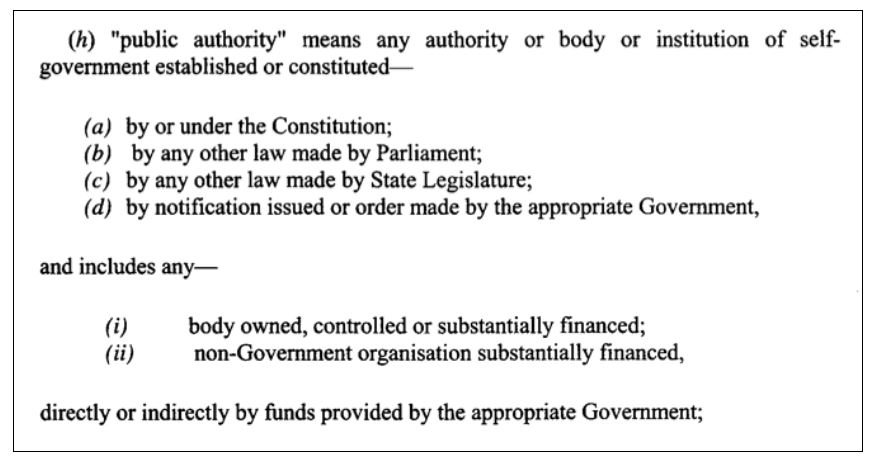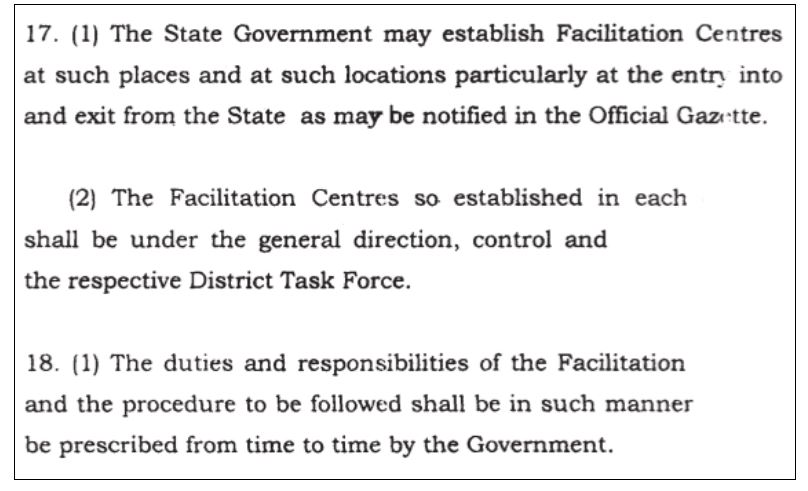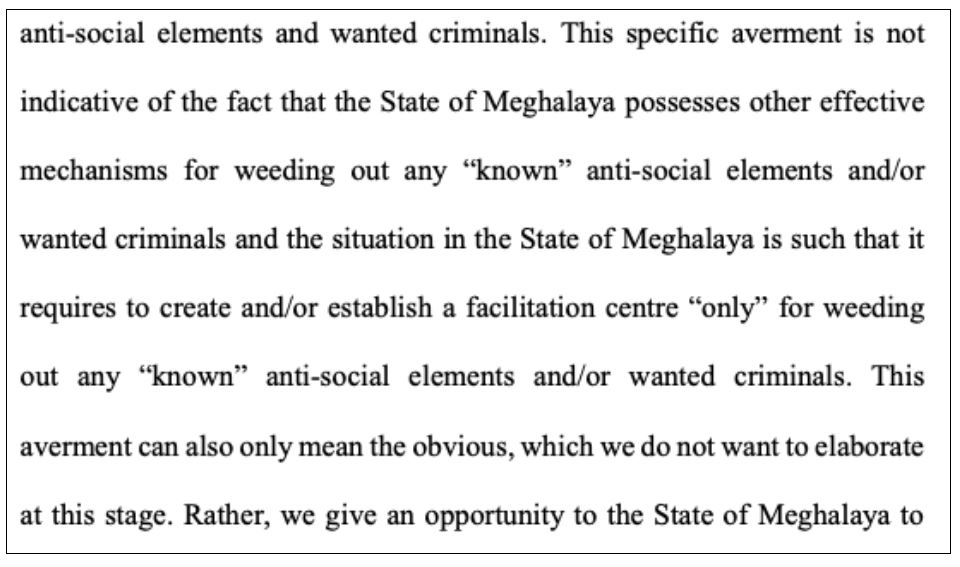In this roundup of court judgements, we look at Constitutional Courts’ remarks & directions on induction of women in Military College, facilitation centres in Meghalaya, guidelines on reporting of sexual harassment at workplace cases . The courts were also informed of the status of compensation awarded to COVID-19 deaths and the functioning of the PM-CARES fund.
Supreme Court: Directed the Union of India to address the issue of induction of women to Rashtriya Military School and College
Taking a cue from the decision of defence forces to allow induction of women into the armed forced through the National Defence Academy (NDA), the Supreme Court observed that that the issue of admission to girls in Rashtriya Indian Military College (RIMC) has to be addressed and cannot be postponed.
The court was hearing a Public Interest Litigation (PIL) filed by Advocate Kailas Udhavrao More against the exclusion of girl candidates from Rashtriya Indian Military School and other Schools and Colleges run under the aegis of Ministry of Defence like the Indian Military College, Sainik School, National Yacht training school. In addition to this, the court was also considering an application filed by the Centre for Reforms, Development and Justice seeking directions to the Centre to amend its policy for admission to RIMC Dehradun permitting girl students to apply and take admission in courses offered for boy students at par without any gender inequality.
The petition filed by Kailas Udhavrao More has challenged the notification (dated 02 February 2021) issued for Rashtriya Indian Military College allowing admission of boys only and the notification issued for All India Sainik School Entrance Examination giving only 10 admissions as against 90 seats which are reserved for the boys.
With respect to Sainik Schools, the bench of Justice SK Kaul and Justice BR Gavai had on an earlier occasion made note of the Union of India’s affidavit which stated that the process of admitting girls have already started and will be further expanded. In the earlier judgement, the court noted the following about RIMCs:

Therefore, the apex court directed the Union of India to address the issue of induction of women to Rashtriya Military School and College at par with the issue of induction of women to NDA and file an affidavit before the Court within 2 weeks.
PMO informs Delhi High Court: No control of Central or State Govts in the functioning of PM-CARES Funds Trust
In an affidavit submitted on behalf of the PM-CARES Fund Trust by the Under Secretary at Prime Minister’s Office before the Delhi High Court, it was clarified that PM-CARES is a public charitable trust and that it is not created by or under the Indian Constitution or any other statute, and the amount received by it does not go in the Consolidated Fund of India.
The high court was hearing a plea seeking a declaration that PM-CARES Fund is “State” under Article 12 of the Constitution. The Petitioner, Samayak Gangwal, also challenged the PMO’s order rejecting his RTI application stating that PM-CARES was not a “public authority” within the meaning of Section 2(h) of the Right to Information (RTI) Act.

The affidavit clarifies that there is no control of either the Central Government or the State Government in the functioning of the PM-CARES Trust.
The affidavit explains that PM-CARES Fund has been set up as a public charitable trust and is not created by or under the Constitution of India or by any law made by the Parliament or by any State Legislature. Further, the affidavit highlights the following:
- PM CARES Fund comprises of voluntary donations made by individuals and institutions and is not a part of the business or function of the Central Government in any manner.
- Merely because some Government officer provides ex-gratia services to the public trust, can have no relevance.
- The composition of the board of trustees can never be a determinative factor to ascertain whether the respondent is a “public authority” or not.
- A Government officer providing secretarial assistance on an honorary basis while discharging his official duties can never be a relevant consideration for declaring a body to be a public authority.
- The mere grant of certain tax exemptions to the voluntary donations made to a public trust is not a determinative factor for the purpose of section 2(h) of the RTI Act.
Moreover, the affidavit emphasises that the Trust functions with transparency and its funds are audited by an auditor who is a Chartered Accountant drawn from the panel prepared by the Comptroller and Auditor General of India. The audited report is put on the official website of the Trust along with the details of the utilization of funds.
Supreme Court expresses satisfaction with Centre’s decision on Rs. 50,000 Ex-Gratia for COVID deaths.
In an earlier judgement (dated 30 June 2021), the Supreme Court directed the National Disaster Management Authority (NDMA) to frame guidelines for recommending minimum ex-gratia assistance for the victims of the COVID-19 pandemic.
On 22 September 2021, the Centre informed Supreme Court that the families of those who died due to COVID-19 will receive Rs. 50,000 ex gratia from the State Governments. The affidavit clarifies that the ex-gratia assistance to families affected by COVID-19 deaths will continue to be provided for deaths that may occur in the future phases of the pandemic as well or until further notification.
The funds will be paid by the States from the State Disaster Response Fund (SDRF). The affidavit stated that the District Disaster Management Authority (DDMA)/District Administration would disburse the ex-gratia assistance to the next of kin of the deceased persons.
The NDMA is also to constitute a Committee at District Level consisting of:
- Additional District Collector
- Chief Medical Officer (CMOH)
- Additional CMOH/ Principal or HOD Medicine of a Medical College (if one exists in district)
- Subject Expert
This committee is to provide necessary remedial measures of the grievances regarding certification of COVID-19 deaths. The apex court expressed satisfaction with the Centre’s decision.
Meghalaya HC: Objects to the establishment of facilitation centres under Meghalaya Resident Safety and Security Act
In Ibahunlang Nongkynrih & Ors. Vs. State of Meghalaya & Ors., the high court expressed strong reservations against sections 17 and 18 of the Meghalaya Resident Safety and Security Act (MRSSA), 2016 which allow for the creation of ‘facilitation centres’ for the purpose of ‘weeding out any known anti-social elements and wanted criminals’.

The high court was hearing a Public Interest Litigation (PIL) petition that challenged the constitutional validity of MRSSA, 2016.
The bench of Chief Justice Biswanath Somadder and HS Thankhiew noted that the State of Meghalaya has the legislative competency to enact the legislation in the exercise of powers conferred under the various Constitutional provisions. However, the bench objected to the statutory provisions that permit the establishment of facilitation centres.
The Counsel for State claimed that the purpose of establishing facilitation centres under the Act is only for verification of tenants and weed out any “known” anti-social elements and wanted criminals.

The bench directed the State of Meghalaya to spell out the purpose clearly and categorically of establishing facilitation centres under the provisions of sections 17 and 18 of MRSSA, 2016.
The court also emphasised that the State should come up with other effective mechanisms without impeding upon the fundamental rights of the residents.
Bombay HC: No media reporting, public disclosure of harassment at workplace case judgments without prior approval
The Bombay high court has directed that cases under the Sexual Harassment of Women at the Workplace (Prevention, Prohibition and Redressal) Act, 2013 will be heard either in-camera or in the judge’s chambers; orders are not to be passed in open court and should not be uploaded on the official HC website either.
The bench of Justice Gautam Patel emphasised that as of now, there are no established guidelines for such matters and the guidelines were a “minimum requirement.”

Some are the salient features of the guidelines include:
- In all orders, the endeavour will be to anonymise the identities of the parties.
- In the order sheets, the names of the parties will not be mentioned. The orders will read “A v B”, “P vs D” etc.
- In the body of the order, the parties will not be referred to by their names but only as to Plaintiff, Defendant No.1, etc. There will be no mention of any personally identifiable information such as email ids, mobile or telephone numbers, addresses etc. No witness’s names will be mentioned, nor will their addresses be noted.
- Orders/judgments on merits will not be uploaded.
- All orders and judgments will be delivered in private, that is to say, not pronounced in open court but only in chambers or in-camera.
- Public Access – Orders cannot be published without the court’s direction.
- If any order is to be released into the public domain, this will require a specific order of the court.
- This will be on the condition that only the fully anonymised version of the order of judgement is let into the public domain for publication.
The guidelines have further barred the media from publishing proceedings under the Act or reporting on a judgement without the court’s permission. Breach of the guidelines or publishing any party’s name or their information, even if it is in the public domain would amount to contempt of court.


